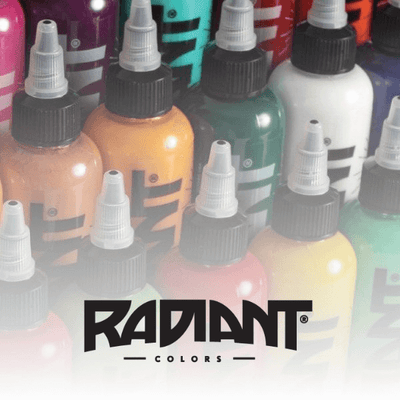Are you an avid tattoo enthusiast or a professional tattoo artist? As the world of tattoo art continues to evolve, you may find yourself wondering about the future and how it will impact your passion or livelihood.
In this article, we'll explore some exciting yet challenging developments that could reshape the tattoo industry in the years to come. Get ready to gain insights and prepare for the evolving landscape of tattooing.

Technological advancements in tattoo art
One of the most significant changes expected in tattoo art is technology integration. Virtual reality (VR) and augmented reality (AR) are set to revolutionise how people approach tattoos. Tattoo artists may use AR/VR to project tattoo designs onto a client's body, allowing them to visualise the final result in real time. This technology can also enhance the tattooing process, making it more precise and efficient.
Additionally, advancements in tattoo removal technology will likely become more accessible and less painful. Laser technology and other innovative methods may offer quicker and more effective tattoo removal, making it easier for people to modify or remove tattoos as their tastes and preferences change.
Furthermore, the development of biotechnology may lead to innovative tattoo inks. Imagine tattoos that change colour based on your mood or body temperature or tattoos that can monitor your health by detecting specific biomarkers. These biotechnological innovations could redefine the possibilities of tattoo art.
If you're intrigued by the fusion of technology and tattoo art, you won't want to miss our article The future of tattooing: Emerging tattoo technologies and trends. Explore the fascinating world of AR/VR, biotech inks, and more in our in-depth article.
Evolving tattoo styles and trends
Tattoo styles and trends constantly evolve, and the next decade will be no different. Traditional and neo-traditional styles may remain popular, but we can also expect to see new styles emerging. Realism and hyperrealism tattoos will continue to captivate enthusiasts, while watercolour and abstract styles may gain even more traction.
However, if you're truly curious about the cutting-edge developments in tattoo art, don't miss the article The future of tattoo art: AI-generated tattoo designs. This intriguing topic explores how artificial intelligence is revolutionising the tattoo design industry, opening up a world of creativity and innovation like never before.
Cultural influences will continue to shape tattoo design. The fusion of different cultural elements, driven by globalisation, will likely inspire unique and diverse tattoo designs. As people become more interconnected, tattoo artists will draw inspiration from a wider range of cultural sources, creating an exciting blend of styles and symbolism.

Sustainability and eco-friendly practices
Environmental consciousness is a growing concern across various industries, including tattoo art. In the coming years, we can anticipate a major shift towards sustainability within the tattoo community. Biodegradable tattoo ink options may become more prevalent, reducing the environmental impact of tattooing. Tattoo studios may adopt sustainable practices, such as recycling and minimising waste, to reduce their carbon footprint.
Vegan-friendly tattoo products, including ink and aftercare products, may become the norm as more people embrace ethical and cruelty-free alternatives. This trend aligns with the broader movement towards sustainability and responsible consumer choices.
If you want to learn more about sustainable tattooing and eco-friendly practices, check out our in-depth article on Sustainable tattooing: Eco-friendly practices for the conscious artist. In it, we delve deeper into how tattoo artists and studios can contribute to environmental consciousness while creating stunning works of art.
Tattoo placement and body modification
Tattoo placement is becoming increasingly creative and unconventional. Beyond the traditional areas like arms and backs, people are exploring unique body placements such as the inner ear, fingers, and even the inside of the lip. The next decade may see even more daring and innovative tattoo placements as people seek to express themselves in new and exciting ways.
Furthermore, advancements in body modification techniques may complement tattoo art. Integrating tattoos with other forms of body art, such as scarification, dermal implants, or body painting, could create entirely new forms of artistic expression.
Tattoo artists and training
The demand for highly skilled tattoo artists will rise in the next decade. Formalised education and apprenticeship programmes may become more common as the industry seeks to maintain high-quality standards and ensure client safety. Technology is also likely to play a role in artist training, with virtual classrooms and digital resources enhancing the learning experience.

Conclusion
The future of tattoo art is poised at an exciting juncture, with technological, cultural, and artistic shifts shaping its trajectory. While challenges exist, particularly in balancing tradition with innovation and navigating regulatory landscapes, the potential for growth and transformation is immense.
As we look forward to the next decade, the canvas of human skin is set to become an ever more dynamic and expressive medium, reflecting the changing contours of our society and the boundless creativity of the human spirit.
Amidst these exciting advancements, the importance of tattoo aftercare remains paramount. Products like MTS Tattoo Balm will play a crucial role in preserving the artistry and expression encapsulated in each tattoo. As the industry evolves, the need for high-quality aftercare products that support the healing process and maintain the vibrancy of tattoos will become more important than ever.




























































 Studio supplies
Studio supplies












 Power & batteries
Power & batteries







 Aftercare
Aftercare



















 Apprentice
Apprentice


 Piercing & jewellery
Piercing & jewellery







 PMU supplies
PMU supplies



 New arrivals
New arrivals
 Gift vouchers
Gift vouchers
 Shop all
Shop all









































